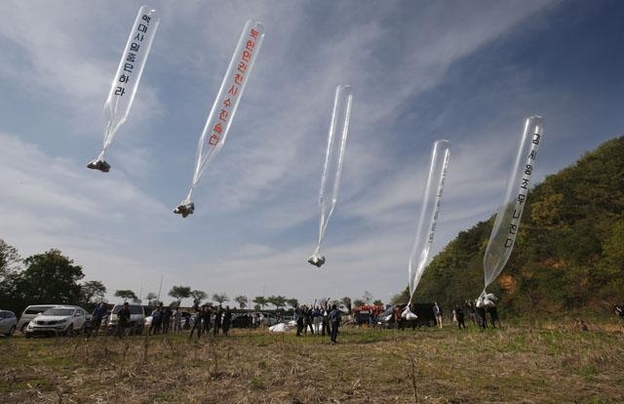The South Korean government’s crackdown on nonprofit groups led by North Korean defectors for sending anti-Pyongyang leaflets across the border has met with a severe backlash from human rights advocates.
Thor Halvorssen, president of the Human Rights Foundation, a New York-based organization that promotes human rights and freedom, said Seoul’s decision to revoke operation license and seek prosecution of the defector groups is a violation of freedom of speech and expression, in a recent interview with a local media outlet.
He said his organization is seeking to raise the matter at the United Nations Working Group on Arbitrary Detention, which investigates cases of arbitrary arrest and detention, if the Korean prosecutors go ahead and indict the two defector groups -- Fighters for a Free North Korea and Kuensaem -- that are at the center of the leafleting campaign.
Following Seoul’s announcement to file a criminal complaint against the two groups and revoke their operation permits last month, the HRF sent an open letter to President Moon Jae-in urging to respect freedom of expression of the defectors.
“We are appalled and alarmed by this recent decision. South Korea has been one of the few countries in Asia that has been able to achieve true democracy, and with it, individual freedom,” the letter said.
“Stripping two important defector-run organizations of their legal status would suggest that the current administration is not holding itself to the standard of a liberal democracy, in which individual freedoms are protected and valued, but instead sliding dangerously into authoritarianism, in which civil activism and free speech are routinely suppressed.”
The group, stressing Moon’s past stint as a human rights lawyer and someone who fought on the frontlines of pro-democracy movements in 1970s and 80s, called on the government to let defectors enjoy their freedoms, “to criticize and undermine the dictatorial regimes that led them to leave their home country in the first place.”
Singne Poulsen, the Seoul office chief of the UN Office of High Commissioner for Human Rights, echoed a similar stance.
“It’s very difficult to give information to people in North Korea. There are organizations who’re trying to reach out to North Koreans by flying balloons, and there are some who try to get information through radios. I think their intentions are very genuine,” she said referring to the propaganda leaflets, during an interview with Yonhap News Agency last month.
She also underlined that it is not the balloons that cause a security threat, but the response to them. “So we just need to keep this whole context in mind when we talk about balloons causing a security threat.”
Suzanne Scholte, chair of North Korea Freedom Coalition, a US-based organization working for human rights in North Korea, on Thursday sent a letter to President Moon, calling for the country to “protect, rather than target, human rights activities” as an act of free expression.
On concerns that Seoul’s recent clampdown is hurting individual rights, an official at the Unification Ministry acknowledged that while the leaflets distribution is part of individual’s right to freedom of expression, it could be restricted if it causes security risks to the people living in the border area.
“The rights of freedom of expression to (reach out to) North Koreans (by sending leaflets) should be exercised in a way that does not trigger tension between the two Koreas, and undermine the safety of people living in the border area,” he said. “We view that distributing anti-Pyongyang leaflets and materials to the North doesn’t help much in fulfilling North Korean peoples’ right to know.”
The ministry has been pushing to stop such activities, saying it could revoke the operation permits of the two defector groups as early as this week. Once their license is revoked, they will not be allowed to publicly raise funds, while donors will not be eligible for various tax benefits.
Police have also raided the offices of the two organizations and questioned their leaders, after the ministry filed a criminal complaint against them.
The ministry on Thursday said that it would inspect dozens of other government registered activist groups this month, to see if they were involved in sending anti-North Korea leaflets.
The anti-North Korea propaganda leaflets flying across the border has become a thorny issue amid worsening tension between the two Koreas recently.
Enraged by the defector groups sending leaflets condemning North Korean leader Kim Jong-un and the country’s reclusive regime, Pyongyang publicly blew up the inter-Korean liaison office in its border city Kaesong last month, and warned that it would take further action if Seoul fails to stop the balloon launches.
By Ahn Sung-mi (
sahn@heraldcorp.com)







![[Today’s K-pop] Blackpink’s Jennie, Lisa invited to Coachella as solo acts](http://res.heraldm.com/phpwas/restmb_idxmake.php?idx=644&simg=/content/image/2024/11/21/20241121050099_0.jpg)
